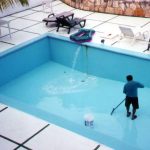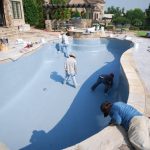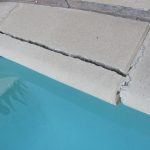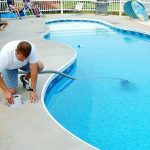A gunite pool offers durability and a beautiful finish, but like any other pool, it can develop cracks over time. These cracks not only compromise the aesthetic appeal of your pool but may also cause long-term damage if left unchecked. Pool owners often ask, “Can a cracked gunite pool be repaired?” The good news is that gunite pool cracks can indeed be repaired, restoring your pool to its former glory.
At Pool Responder, the best pool cleaning company in Dr. Gateville, Texas, we have successfully handled pool maintenance and repairs for several years. In this article, we will discuss the causes, consequences, and repair methods for gunite pool cracks, ensuring that your pool remains safe and functional.
Causes of Gunite Pool Cracks
Ground Movement and Shifting Soil
One of the most common causes of gunite pool cracks is the shifting of the soil beneath and around the pool. Gunite, being a highly durable material, still depends on a solid foundation. When the ground beneath the pool shifts or settles unevenly, stress is placed on the pool shell, causing cracks to form.
Texas is known for its shifting soil due to fluctuating moisture levels. Heavy rains followed by dry spells can lead to ground movement, making pools in Dr. Gateville more susceptible to cracking.
Poor Installation Practices
Improper installation or subpar craftsmanship can also lead to cracks. If the gunite pool was not installed correctly or if the materials used were of low quality, you might face issues later on. In some cases, insufficient reinforcement of the pool shell or an uneven application of gunite can create weak spots, which can develop into cracks over time.
Age of the Pool
Like all structures, pools age over time. A gunite pool that has been in service for several years may develop cracks simply due to the natural wear and tear that occurs over time. Pools that are over 10-15 years old are more prone to developing surface cracks, which can expand if not addressed.
Consequences of Gunite Pool Cracks
Water Loss and Structural Damage
When a crack develops in your pool, water can seep through, leading to loss of pool water and even damage to the surrounding structures. If left untreated, these cracks may expand, allowing more water to escape, which can cause the pool’s foundation to weaken.
In severe cases, cracks can cause more extensive damage, such as undermining the pool’s structural integrity, leading to the need for expensive repairs. At Pool Responder, we provide swimming pool equipment repair services to ensure that any potential damage caused by cracks is minimized.
Algae Growth and Water Quality Issues
Cracks in your pool can become breeding grounds for algae, especially when untreated water gets trapped in the fissures. This can lead to poor water quality and require additional cleaning efforts. If you notice algae blooming in your pool, it might be a sign of undetected cracks.
At Pool Responder, our green to blue pool treatment services are designed to restore your pool’s cleanliness and clarity while addressing any underlying issues that may be contributing to poor water quality.
Aesthetic Decline
Cracks, even minor ones, can affect the overall appearance of your pool. The smooth, inviting surface of your gunite pool may become marred by visible lines, making your pool look older and less well-maintained than it is. Regular inspections and timely repairs are key to preserving the beauty of your pool.
Repairing a Cracked Gunite Pool
Identifying the Type of Crack
Before repairing a cracked gunite pool, it’s important to identify the type and severity of the crack. Not all cracks are the same. Structural cracks affect the pool shell and can cause significant water loss, while surface cracks are more superficial and may only affect the pool’s finish.
At Pool Responder, we inspect pools thoroughly to identify the type of crack and recommend the most effective repair solution.
Epoxy Injection for Minor Cracks
For minor surface cracks, an epoxy injection is one of the most common and cost-effective methods of repair. Epoxy injections involve filling the cracks with a special resin, which hardens to form a watertight seal. This method works well for hairline cracks and small surface damage that hasn’t compromised the pool’s structural integrity.
As an affordable pool cleaning service, Pool Responder offers competitive pricing on epoxy injections and other crack repair methods to ensure your pool stays in top condition without breaking the bank.
Patching with Hydraulic Cement
Another method used to repair cracks in a gunite pool is patching with hydraulic cement. This involves applying a waterproof cement mixture to the cracks to stop water from seeping through. Hydraulic cement is particularly useful for structural cracks that require more durable, long-term solutions.
Our swimming pool start-up services often include inspecting and patching up any cracks that may have developed during pool downtime.
Resurfacing the Pool
For more extensive damage, resurfacing the entire pool may be necessary. Resurfacing involves removing the damaged top layer of the pool and applying a fresh layer of finish, such as plaster, pebble, or quartz. Resurfacing not only repairs the cracks but also gives the pool a fresh look.
While resurfacing can be a more expensive option, it’s an effective way to prolong the life of your pool. At Pool Responder, we recommend resurfacing as part of long-term pool maintenance to avoid future cracks.
How to Prevent Future Cracks
Regular Pool Maintenance
One of the best ways to prevent future cracks is through regular pool maintenance. Scheduling routine inspections with a professional pool cleaning company like Pool Responder helps detect small issues before they turn into larger problems.
By keeping up with pool cleaning, water balancing, and equipment maintenance, you can reduce the risk of cracks developing due to neglect.
Soil Stabilization and Proper Drainage
Addressing soil conditions around the pool can help prevent ground movement, which is a leading cause of cracks. Ensuring that your pool has proper drainage systems and that the surrounding soil remains stable is key to preventing future issues.
Conclusion
In conclusion, gunite pool cracks are a common issue but can be effectively repaired using methods such as epoxy injections, hydraulic cement, or resurfacing. At Pool Responder, we specialize in swimming pool equipment repair and offer comprehensive maintenance services to ensure your pool remains in top condition.
If you’re dealing with a cracked gunite pool in Dr. Gateville, Texas, contact Pool Responder, the best pool cleaning company, for affordable and effective solutions.







